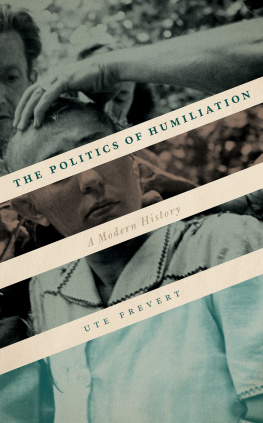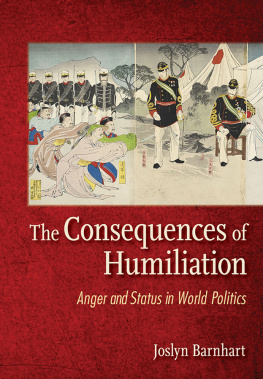Ute Frevert - The Politics of Humiliation: A Modern History
Here you can read online Ute Frevert - The Politics of Humiliation: A Modern History full text of the book (entire story) in english for free. Download pdf and epub, get meaning, cover and reviews about this ebook. year: 2020, publisher: OUP Oxford, genre: Politics. Description of the work, (preface) as well as reviews are available. Best literature library LitArk.com created for fans of good reading and offers a wide selection of genres:
Romance novel
Science fiction
Adventure
Detective
Science
History
Home and family
Prose
Art
Politics
Computer
Non-fiction
Religion
Business
Children
Humor
Choose a favorite category and find really read worthwhile books. Enjoy immersion in the world of imagination, feel the emotions of the characters or learn something new for yourself, make an fascinating discovery.
- Book:The Politics of Humiliation: A Modern History
- Author:
- Publisher:OUP Oxford
- Genre:
- Year:2020
- Rating:4 / 5
- Favourites:Add to favourites
- Your mark:
- 80
- 1
- 2
- 3
- 4
- 5
The Politics of Humiliation: A Modern History: summary, description and annotation
We offer to read an annotation, description, summary or preface (depends on what the author of the book "The Politics of Humiliation: A Modern History" wrote himself). If you haven't found the necessary information about the book — write in the comments, we will try to find it.
The Politics of Humiliation: A Modern History — read online for free the complete book (whole text) full work
Below is the text of the book, divided by pages. System saving the place of the last page read, allows you to conveniently read the book "The Politics of Humiliation: A Modern History" online for free, without having to search again every time where you left off. Put a bookmark, and you can go to the page where you finished reading at any time.
Font size:
Interval:
Bookmark:


Great Clarendon Street, Oxford, ox 2 6 dp , United Kingdom
Oxford University Press is a department of the University of Oxford. It furthers the Universitys objective of excellence in research, scholarship, and education by publishing worldwide. Oxford is a registered trade mark of Oxford University Press in the UK and in certain other countries
Ute Frevert 2020
The moral rights of the author have been asserted
First Edition published in 2020
Impression: 1
All rights reserved. No part of this publication may be reproduced, stored in a retrieval system, or transmitted, in any form or by any means, without the prior permission in writing of Oxford University Press, or as expressly permitted by law, by licence or under terms agreed with the appropriate reprographics rights organization. Enquiries concerning reproduction outside the scope of the above should be sent to the Rights Department, Oxford University Press, at the address above
You must not circulate this work in any other form and you must impose this same condition on any acquirer
Published in the United States of America by Oxford University Press
198 Madison Avenue, New York, NY 10016, United States of America
British Library Cataloguing in Publication Data
Data available
Library of Congress Control Number: 2019949404
ISBN 9780198820314
ebook ISBN 9780192551924
Printed and bound in Great Britain by Clays Ltd, Elcograf S.p.A.
Links to third party websites are provided by Oxford in good faith and for information only. Oxford disclaims any responsibility for the materials contained in any third party website referenced in this work.
Sidi Bouzid, Tunisia, December 2010: 26-year-old vegetable merchant Mohamed Bouazizi douses himself with gasoline and sets his body on fire in front of the mayors mansion. After years of police harassment, a female officer who confiscated his wares and slapped him finally drove him over the edge. A journalist later explained Bouazizis self-immolation as demonstrating that he would no longer take the debasement and humiliation. His desperate act of protest then triggered the revolt of dignity that went down in history as the Arab Spring.

Fig. 1. Shena Hardin, Cleveland, Ohio, November 2012
In November 2012, Shena Hardin of Cleveland, Ohio was subjected to something more akin to shame and less to humiliation. She stood at the corner of a busy intersection holding a sign that read: Only an idiot would drive on the sidewalk to avoid a school bus. Hardin, indeed, had done it a few times. As if being fined and having her licence suspended was not enough, the judge sentenced Hardin to a so-called shame sanction: a form of public shaming that clearly marked Hardin as an idiot. Such sentences are intended not only to discipline and punish, but also to educate and improve. On Hardin, the effect was one of ambivalence. First, she demonstrated coolness and nonchalance, despite being visibly aggravated by the media attention. After the judge had her lift the sign up higher, she conceded that she had learned her lesson. But the experience, she added, would not break her.
This distinguishes her case from that of 13-year-old Izabel Laxamana. Angered at finding pictures of her on the internet in a sports bra and leggings, the teenagers father filmed himself cutting off her long hair. Shortly afterwards, he put the video online and it went viral. Unable to bear the humiliation in front of her schoolmates, the girl from Tacoma, Washington committed suicide by jumping off a bridge in May 2015.
The case sounded patently medieval to US journalist Amanda Hess. She notes that while ritual public shaming has become obsolescent as a form of criminal punishment, some parents have started using social media to embarrass and shame children in front of their peers. The publicity afforded by Facebook and YouTube make them perfect venues for castigating those who break the rules, with often tragic consequences for the punished. Teenagers with low self-esteem are helpless in the face of such humiliation: they are broken by their ridiculers as much as by the gaze of the public and its often stinging comments.
Why do people feel the need to embarrass others in publiceven their own childrenand where does this need come from? What is the point of shaming someone, and what effects does it have? Why is shaming widespread even in societies that value dignity, recognition, and respect highly? Is it proof that medieval attitudes are still with us? Or has the enlightened modern era set loose its own desire to shame and humiliate with new forms and targets?
Public shaming puts power on display. By bringing people to their knees in front of others, social actors emphatically assert their superior, more powerful position. According to sociologist Max Weber, power is the probability that one actor within a social relationship will be in a position to carry out his own will despite resistance, regardless of the basis on which this probability rests. Thus, Izabel Laxamanas father exerted power over her. He forbade her from putting selfies on the internet, and when she did it anyway, he humiliated her and, on top of that, made the act of humiliation public. In doing so, he underscored his own power and Izabels inability to defend herself. This humiliation made her bow her head in shame: she wanted to become invisible and saw no other option than to kill herself.
The awareness that shame is a frighteningly powerful emotion stretches all the way back to ancient times in places as far apart as Greece and Iceland. Shame can be deadly and, even if it does not go that far, can still have a lasting effect on the living. Anyone who has ever been deeply shamed knows that shaking the feeling off is not easy. The presence and witness of others is a crucial aspect of it, although we might also secretly feel ashamed of ourselves for doing or thinking something that contradicts our sense of self or common notions of morality and propriety. We might, for instance, feel ashamed for envying a colleague who just got promoted, or for taking joy in watching the boss tear into a colleague in front of the whole office. Acts of public humiliation are generally seen as intolerable displays of disregard for human dignity, or even as attacks on it; thus, if we openly or tacitly approve of them, we might experience shame.
But what makes such acts so despicable? Is it because we know about the power of the public gaze, a gaze that cannot be avoided, that gets beneath our skin and marks the body of the humiliated? When others witness our individual faults or transgressions, this triggers a feeling of shame, which is all the more intense the more we want to be held in high esteem. A child who steals a candy bar from the store and knows that doing so is not allowed might secretly feel ashamed but not show it. However, if the child gets caught and her parents find out about it, she does not need to be told shame on you! to feel it. Being publicly humiliated makes her blush, and she has just one wish: to get away from the others stares as soon as possible.
For these reasons, psychologists call shame a social or interpersonal emotion. It is generally experienced in the presence of othersindeed, only one out of six respondents say that they think of shame as a private, solitary feeling.
Font size:
Interval:
Bookmark:
Similar books «The Politics of Humiliation: A Modern History»
Look at similar books to The Politics of Humiliation: A Modern History. We have selected literature similar in name and meaning in the hope of providing readers with more options to find new, interesting, not yet read works.
Discussion, reviews of the book The Politics of Humiliation: A Modern History and just readers' own opinions. Leave your comments, write what you think about the work, its meaning or the main characters. Specify what exactly you liked and what you didn't like, and why you think so.









